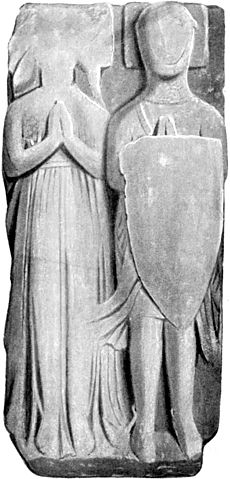Maria de Ergadia facts for kids
Quick facts for kids Maria de Ergadia |
|
|---|---|
| Queen consort of Mann and the Isles Countess of Strathearn |
|
| Died | 1302 |
| Spouse | Magnús Óláfsson Malise II, Earl of Strathearn Hugh, Lord of Abernethy William FitzWarin |
| Issue | Alexander de Abernethy |
| House | Clan MacDougall |
| Father | Eóghan Mac Dubhghaill, Lord of Argyll |

Maria de Ergadia was an important Scottish noblewoman who lived a long time ago. She was a queen and a countess, holding titles like Queen consort of Mann and the Isles and Countess of Strathearn. She passed away in 1302.
Maria's Family and Marriages
Maria was the daughter of a powerful Scottish lord named Eóghan Mac Dubhghaill, Lord of Argyll. This meant she was part of a strong and important family called Clann Dubhghaill.
Maria married four times in her life. Her husbands were all important leaders:
- Magnús Óláfsson, who was the King of Mann and the Isles.
- Maol Íosa II, Earl of Strathearn, an important Scottish earl.
- Hugh, who was the Lord of Abernethy.
- William FitzWarin, another notable figure.
These marriages show how powerful and well-connected Maria's family, Clann Dubhghaill, was in Scotland and beyond.
Life as a Countess
We don't know the exact date Maria married her first husband, King Magnús. He died in 1265. Maria's father was last mentioned in records in 1268. This might have been around the time Maria married her second husband, Maol Íosa II.
Maol Íosa II, the Earl of Strathearn, owed money to the King of Scotland around this time. It's possible this debt was related to his marriage to Maria. Marrying Maria, who was the widow of a king, likely brought him more wealth and respect. For much of her life, Maria was known as the Countess of Strathearn.
Children and Later Life
Maria and her third husband, Hugh, had several children together. One of their children was named Alexander.
After Hugh died, Maria had to go to parliament to discuss her son Alexander's rights to certain lands. In 1292, Maria owed money as part of a dowry for one of her daughters. A dowry was money or property a bride's family gave to her husband.
In 1296, Maria showed her loyalty to Edward I, King of England. At that time, she called herself "the Queen of Man." We don't know when Maria married her fourth husband, William FitzWarin, but he died in 1299. Soon after, Maria received her share of William's belongings and her dower. A dower was a portion of her husband's property given to her for her support after his death.
In 1300, a church official was appointed to help Maria receive her dower in Ireland. Maria passed away in 1302 in London, surrounded by her family. She was buried with William in the Greyfriars church in London. An effigy (a statue or carving) of her second husband, Maol Íosa II, and possibly Maria herself, can be seen in Dunblane Cathedral.
 | Aaron Henry |
 | T. R. M. Howard |
 | Jesse Jackson |

